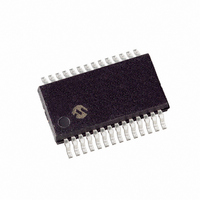PIC18F26J11-I/SS Microchip Technology, PIC18F26J11-I/SS Datasheet - Page 404

PIC18F26J11-I/SS
Manufacturer Part Number
PIC18F26J11-I/SS
Description
IC PIC MCU FLASH 64K 2V 28-SSOP
Manufacturer
Microchip Technology
Series
PIC® XLP™ 18Fr
Datasheets
1.MA180023.pdf
(528 pages)
2.PIC18LF24J10-ISS.pdf
(32 pages)
3.PIC18F24J11-ISS.pdf
(14 pages)
Specifications of PIC18F26J11-I/SS
Core Size
8-Bit
Program Memory Size
64KB (32K x 16)
Core Processor
PIC
Speed
48MHz
Connectivity
I²C, SPI, UART/USART
Peripherals
Brown-out Detect/Reset, POR, PWM, WDT
Number Of I /o
16
Program Memory Type
FLASH
Ram Size
3.8K x 8
Voltage - Supply (vcc/vdd)
2.15 V ~ 3.6 V
Data Converters
A/D 10x10b
Oscillator Type
Internal
Operating Temperature
-40°C ~ 85°C
Package / Case
28-SSOP
Controller Family/series
PIC18
No. Of I/o's
16
Ram Memory Size
3.6875KB
Cpu Speed
48MHz
No. Of Timers
2
Interface
EUSART, I2C, SPI
Processor Series
PIC18F
Core
PIC
Data Bus Width
8 bit
Data Ram Size
3776 B
Interface Type
EUSART, I2C, SPI
Maximum Clock Frequency
48 MHz
Number Of Timers
5
Maximum Operating Temperature
+ 85 C
Mounting Style
SMD/SMT
3rd Party Development Tools
52715-96, 52716-328, 52717-734, 52712-325, EWPIC18
Development Tools By Supplier
PG164130, DV164035, DV244005, DV164005, PG164120, DV164136, DM183032, MA180023, DM183022
Minimum Operating Temperature
- 40 C
On-chip Adc
10 bit, 10 Channel
Package
28SSOP
Device Core
PIC
Family Name
PIC18
Maximum Speed
48 MHz
Operating Supply Voltage
2.5|3.3 V
Lead Free Status / RoHS Status
Lead free / RoHS Compliant
For Use With
AC164322 - MODULE SOCKET MPLAB PM3 28/44QFN
Eeprom Size
-
Lead Free Status / Rohs Status
Details
Available stocks
Company
Part Number
Manufacturer
Quantity
Price
Company:
Part Number:
PIC18F26J11-I/SS
Manufacturer:
DYK
Quantity:
4 282
- Current page: 404 of 528
- Download datasheet (8Mb)
PIC18F46J11 FAMILY
FIGURE 25-4:
Clock failure is tested for on the falling edge of the
sample clock. If a sample clock falling edge occurs
while the clock monitor is still set, and a clock failure
has been detected (Figure 25-5), the following results:
• The FSCM generates an oscillator fail interrupt by
• The device clock source is switched to the internal
• The WDT is reset.
During switchover, the postscaler frequency from the
internal oscillator block may not be sufficiently stable
for timing-sensitive applications. In these cases, it may
FIGURE 25-5:
DS39932C-page 404
setting bit, OSCFIF (PIR2<7>);
oscillator block (OSCCON is not updated to show
the current clock source – this is the Fail-safe
condition); and
Peripheral
Source
(32 μs)
INTRC
Clock
Note:
Sample Clock
Clock Monitor
Output (Q)
OSCFIF
Device
Output
Clock
(2.048 ms)
The device clock is normally at a much higher frequency than the sample clock. The relative frequencies in
this example have been chosen for clarity.
488 Hz
÷ 64
FSCM BLOCK DIAGRAM
FSCM TIMING DIAGRAM
(edge-triggered)
Clock Monitor
C
S
Latch
Clock Monitor Test
Q
Q
Detected
Failure
Clock
Clock Monitor Test
possible.
be desirable to select another clock configuration and
enter an alternate power-managed mode. This can be
done to attempt a partial recovery or execute a
controlled shutdown. See Section 3.1.4 “Multiple
Sleep Commands” and Section 25.4.1 “Special
Considerations for Using Two-Speed Start-up” for
more details.
The FSCM will detect failures of the primary or secondary
clock sources only. If the internal oscillator block fails, no
failure would be detected, nor would any action be
25.5.1
Both the FSCM and the WDT are clocked by the
INTRC oscillator. Since the WDT operates with a
separate divider and counter, disabling the WDT has
no effect on the operation of the INTRC oscillator when
the FSCM is enabled.
As already noted, the clock source is switched to the
INTRC clock when a clock failure is detected; this may
mean a substantial change in the speed of code execu-
tion. If the WDT is enabled with a small prescale value,
a decrease in clock speed allows a WDT time-out to
occur and a subsequent device Reset. For this reason,
Fail-Safe Clock Monitor events also reset the WDT and
postscaler, allowing it to start timing from when execu-
tion speed was changed and decreasing the likelihood
of an erroneous time-out.
Oscillator
Failure
FSCM AND THE WATCHDOG TIMER
© 2009 Microchip Technology Inc.
Detected
Clock Monitor Test
Failure
Related parts for PIC18F26J11-I/SS
Image
Part Number
Description
Manufacturer
Datasheet
Request
R

Part Number:
Description:
Manufacturer:
Microchip Technology Inc.
Datasheet:

Part Number:
Description:
Manufacturer:
Microchip Technology Inc.
Datasheet:

Part Number:
Description:
Manufacturer:
Microchip Technology Inc.
Datasheet:

Part Number:
Description:
Manufacturer:
Microchip Technology Inc.
Datasheet:

Part Number:
Description:
Manufacturer:
Microchip Technology Inc.
Datasheet:

Part Number:
Description:
Manufacturer:
Microchip Technology Inc.
Datasheet:

Part Number:
Description:
Manufacturer:
Microchip Technology Inc.
Datasheet:

Part Number:
Description:
Manufacturer:
Microchip Technology Inc.
Datasheet:











